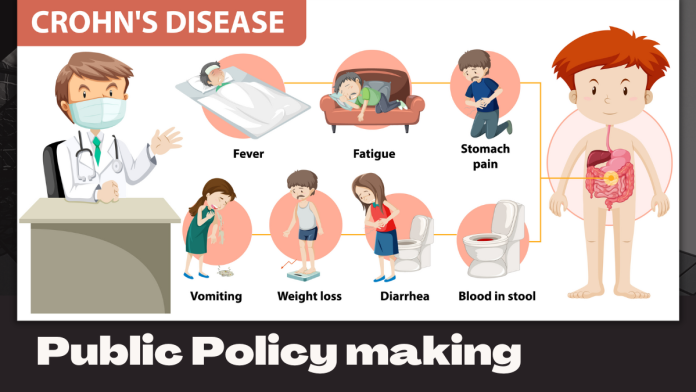Crohn’s disease is a kind of inflammatory bowel disease (IBD). it results in swelling in the digestive tract and mostly affects the intestinal path of the body. This disease is an abnormal immune system response that leads to chronic inflammation in the digestive tract. It occurs majorly in the small intestine and colon. This disease can affect any part of the Gastrointestinal (GI) tract i.e. from the mouth to the anus. The effects of this disease can be mild to severe. This pain can result in severe diarrhea, abdominal pain, fatigue, weight loss, and malnutrition. Although, this disease can lead to life-threatening complications.
Symptoms of Crohn’s disease
Crohn’s disease can affect any person. It is found that children are more affected by this disease, especially boys. Crohn’s disease has symptoms that develop gradually. The symptoms show up suddenly in the body, without any warning. The symptoms include:
- Diarrhea
- Fever
- Abdominal cramps
- Blood in the stool
- Fatigue
- Weight loss
- Loss of appetite
- Feeling as if bowels aren’t empty after a bowel movement
- A frequent need for bowel movements
These symptoms are often confusing and you might think you are facing food poisoning or some kind of allergy. If the symptoms persist for a long time then the disease can become even more serious with time. The symptoms in further stages may lead to:
- Ulcers from anyplace in between mouth to anus
- Inflammation of skin and joints
- Shortness of breath due to anemia
- A perianal fistula
This disease should get diagnosed in the early phase to avoid these serious issues.
What are the causes of Crohn’s disease?
No one factor can be blamed for getting this disease. Various factors play a role in the development of this disease:
- Heredity: genetics play a huge role in the passing of diseases. Crohn’s disease is common in people who have a family history of this disease. But the chances of this are very low.
- Immune System: there is a chance that a virus or bacteria can trigger Crohn’s disease. It is so because when the body is fighting a microorganism, then it attacks the cells in the digestive tracts as well.
Other factors that can cause Crohn’s disease are:
- Age: Although Crohn’s disease can occur at any age, there are high chances that it most likely develops with growing age. Most people who are diagnosed with this disease are around 30 years old.
- cigarette smoking: is a factor that lowkey contributes to the risk of getting Crohn’s disease. The good part is that this factor is controllable. Smoking can ample up your chances of catching more serious diseases like lung cancer. If you smoke, then it is time to quit.
- Ethnicity: your ethnicity matters as contains a history. Data suggests that white people are at the highest risk of getting Crohn’s disease, especially people of Eastern Europe Jewish descent. Although, this disease is rising among Black people who reside in the United Kingdom and North America.
- Medications: certain medications like ibuprofen, naproxen sodium, and diclofenac sodium can lead to inflammation of the bowel. These medicines can make Crohn’s even worse. Fake medicines can lead to diseases just like Crohn’s disease. A pharmacy export license thus allows regulated medicines to enter a country and avoids the spread of fake medicines.
How to manage Crohn’s disease?
Here are a few tips that you should follow if you are suffering from Crohn’s disease:
Control your diet
Avoid eating food items that tend to make the symptoms even worse. Keep the dairy and carbs in check in your diet. Also, avoid those foods that are troublesome for you i.e. that negatively affect your body. The most common food components that make the symptoms worse are carbohydrates, dairy, high-fiber foods, and low-fiber foods. You should consult a doctor as they will assess what kind of food need to be removed from the diet.
Put a limit on dairy products
Dairy can worsen abdominal pain, diarrhea, and gas. If you are lactose intolerant, lose dairy at all costs.
Reduce Fiber intake
The more fiber your body intakes, the more stool it will create. It makes the stool bulky and difficult to pass. If you have narrow spots in the intestines, then the passing of fiber will result in abdominal pain and worsen the symptoms of Crohn’s disease. Do not switch to a high-fiber diet without consulting your doctor.
Intake plenty of fluids
The intestines need water to function properly. So stay hydrated by drinking water regularly. Avoid drinking alcohol as it leads to dehydration in the body. Even caffeine can lead to dehydration. So limit your alcohol and caffeine intake.
Final Note:
Crohn’s disease is a kind of inflammatory bowel disease. No one factor can be blamed for getting this disease. Mostly, it is due to genetic reasons and a low immune system. It has serious effects on the body such as Diarrhea, Fever, Abdominal cramps, Blood in the stool, Fatigue, Weight loss, Loss of appetite, and A frequent need for bowel movements. So while choosing a health policy-making cycle, pick a plan that covers such inflammatory bowel diseases as this disease can happen to anyone without any prior warning. Always look for a health public policy, making sure that it provides you a complete cover from multiple diseases.


